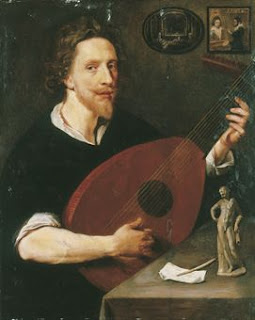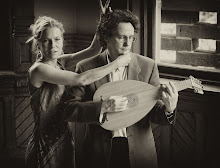A portrait thought to be Nicholas Lanier
O eyes leave off your weeping Robert Hales (d. before 1616)
My heavie sprite Anthony Holborne (d. 1602)
Merry Melancholie Thomas Robinson (c. 1588-1610)
It was a time when silly bees could speake John Dowland (1563-1626)
Time stands still Dowland
Behold a wonder Dowland
Queen Elizabeth, her Galliard Dowland
Weep no more Nicholas Lanier (1588-1666)
Fire fire Lanier
Pavana Ploravit Holborne
The Fairy Round Holborne
As it fell on a Holyday Holborne
The Marigold Lanier
Thou mightie God Dowland
O beaux yeux Charles Tessier (fl.c 1600)
Earl of Salisbury Pavan William Byrd (1540-1623)
Spanish Pavan Robinson
Amour n'avance Tessier
S’il m’en souvient Tessier
Solus cum sola Dowland
The Queenes Gigue Robinson
Bravely deck’d Thomas Campion (1567-1620)
Swashbucklers like Sir Francis Drake, Sir Walter Raleigh, Sir Philip Sidney and Robert Devereaux, Earl of Essex define for us the Triumphs of Gloriana with their voyages and their Spaniard baiting and their poems, but Sir Robert Cecil, following in his father’s footsteps as Elizabeth’s most trusted advisor, was probably more crucial to Elizabeth’s last years and the smooth transition of the English crown to the Scottish King James at her death. James rewarded Cecil for this with the title Earl of Salisbury.
Patronage was the only important currency at court. The first years of Cecil’s career were spent in ‘war by other means’ with the Earl of Essex. When the post of attorney-general became vacant Essex tried to obtain the job for his creature Francis Bacon, but William Cecil put forward his hunchbacked, Machiavellian son Robert, and Elizabeth, though quite willing to shower gifts and money on the pretty-boy Essex, promoted the younger Cecil. Bacon seems to have realized that he had backed the wrong horse and started switching allegiance, even though he had co-written an entertainment making fun of Cecil with Essex from which Behold a wonder and Time stands still are taken. Perhaps that was why Dowland addressed a letter to Cecil from Frankfurt detailing what English expatriate plots he had heard of on a trip to Florence. He seems to be saying ‘I’ve been offered these jobs at foreign courts. Do you need any spying done?’ On the Italian trip, as well as intelligence, Dowland also picked up the latest far out harmonic vocabulary of Marenzio and Gesualdo which can be heard in his Thou mightie God.
Dowland translated a Latin book of music theory and dedicated that book to Cecil. Robinson dedicated a cittern method to him and worked in his household along with Holborne, Tessier and the young Lanier (the music you hear by him this evening is probably from after he worked for Cecil). Byrd dedicated a variant of the Spanish Pavan to him, arranged here from the keyboard original and put next to Robinson’s variations for comparison.
One great triumph of Cecil’s spy network was the discovery of the Gunpowder Plot on the 5th of November 1605, which delivered James and parliament from destruction. How sad that Cecil gets no credit for the discovery in Campion’s song, published only a couple of years after Cecil’s death.
Amour n'avance
Love does not hasten one's demise;
Howsoever it offends the heart,
Not all the wounded die.
Its blows won't kill you, in any case;
I've proved it: the years pass.
Not all the wounded die.
So don't fear, o soldiers,
if its attack has pierced you:
Not all the wounded die.
Accept my aid from this point.
I have the cure; come on, go forward!
Not all the wounded die.
O beaux yeux
O beautiful eyes, who know how to charm so sweetly,
that I must live blind, or die in servitude;
O beautiful eyes who have taught me to love,
how you make me pay for my learning.
O beautiful eyes, I neither see nor live but by you;
I am a body without a soul when I am out of your sight.
But when I see you laughing so, and so sweet,
then love, to animate me, transmutes into soul.
O beautiful eyes, who weep flames and blows,
nothing blocks your strikes; the attack is fatal.
You wound just as well from afar as at close range
and your soft glance is the dart of Céphale.
O beautiful eyes, I offer you thus what one offers up to gods:
my soul, in sacrifice, ardently aflame;
the offering is small, but alas, o beautiful eyes,
the fault is with you who have consumed it.
Si je m'en souvient
If I remember, you said to me one day,
as I offered you proposals of love,
that you were not of such weak character
as to judge the heart by the face;
That love cannot so soon be set alight,
that one must be known to be loved,
and that, hastily, I wanted to make a sheaf
of a harvest that was still sprouting.
Your arguments are hard to rebut,
but if you will please listen to my reasons,
you will understand that they are easily vanquished,
that they are no Hector nor Achilles.



